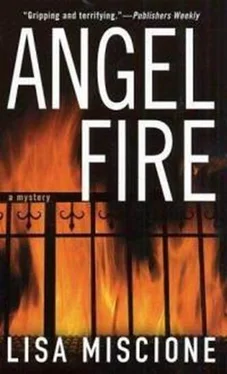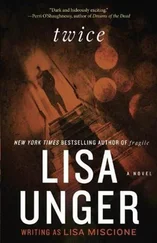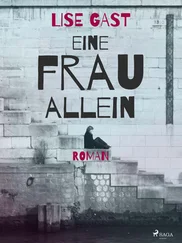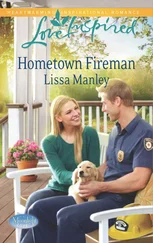He looked into her eyes as one hand traced the smooth skin on her arm and the other delicately took down the zipper on the back of her dress. “It is all right?’’ he asked softly.
“Yes.’’
She helped him slip off his sweater. He was beautiful. Apollo, she called him in her mind. Paolo was his name, she remembered vaguely. He kissed the straps of her dress away and the garment fell to the floor. As he gently cupped her breasts in his hands, kissing them, she undid his pants and reached inside, feeling him hard for her. He groaned at her touch and kissed her mouth with such passion it startled her. He pulled her leg up and she wrapped it around his, moving herself against him. Then he lifted her and carried her to the bed. She leaned on her elbows and watched him step out of pants and black silk boxers.
“Very nice,’’ she said, smiling.
He pulled off her white lace panties with a boyish smile. “You are also ‘very nice,’ as you say. Beautiful, perfect.’’
She laughed, thinking the less he spoke, the better. He lay beside her and traced the center line of her body with a delicate touch. She quivered, ticklish, aroused. And then she was on top of him. She kissed him as she moved her hips in slow, luscious circles. He held her tightly at her hips, pulling himself deeper and deeper into her. She watched his face as he surrendered to his pleasure, moaning. She loved that moment of true yearning; she knew it so well in her own heart. To see it in another made her feel less alone.
It was close to midnight as she pulled her clothes back on. He slept soundly, snoring lightly, sweetly, like a child. She glanced back at him. He was lovely. As she closed the door and walked down the hall, she wrapped her arms around herself as if to protect her heart against the ache that was already setting in. The feeling she would go to the ends of the earth to avoid, the hole in her insides where the wind blew through, was creeping up on her, pulling at her with black ghost-fingers.
In her car in the parking lot, she wept, deep, true tears that welled from some secret place inside her. Tears she couldn’t understand, and couldn’t escape.
When Jeffrey’s phone rang at four a.m., he knew it was her before he picked up.
“Where are you?’’ he answered.
“Santa Fe.’’
“Do you know I’ve been trying to reach you?’’
“I know. I’m sorry.’’
“Right.’’ He cleared his throat. She heard him struggling not to sound the combination of relieved and angry that he was. “Well, what are you doing?’’
“I came to hide out for a while but I’ve run into something down here. Will you come?’’
“You want me to drop everything and come to New Mexico?’’
“Are you working on something big? Something no one else can handle?’’
“Not really.’’
“We both know you don’t have a life,’’ she teased.
He laughed. He could use a vacation. And he did want to see her. “I’ll call you with my flight information tomorrow. You can pick me up at the airport.’’
Jeffrey fought the urge to turn around and bolt from the gangway that led to United Airlines flight number 133 to Albuquerque. It was the same irrational feeling of impending doom that always assailed him when he boarded a plane. He tried without success to control his adrenalinized fear response, the dry mouth and sweating palms, the shallow breathing. Lydia thought it was the funniest thing in the world that someone who had faced down some of the most dangerous, desperate men in the country without a notable rise in his heart rate, experienced abject terror at getting on a plane. “It’s safer than getting into a car,’’ she’d said. And he knew this intellectually. But you had control over a car. If the engine failed on your car, you didn’t plummet thirty-five thousand feet into the ocean. But he kept moving up the narrow aisle, stowed his carry-on in the overhead bin, and squeezed his big frame into the tiny window seat. He liked the window seat because he wanted to be able to see if there was a problem, like black smoke coming from the engine, or maybe an errant bolt of lightning in a cloudless sky. Then, of course, there was the possibility of in-air collisions because of the increasing number of planes in the sky, and pilots who spoke different native languages from the air traffic controllers. To say nothing of the potential for drug addiction and alcoholism among the pilots, airplane mechanics, and air traffic controllers. Really, anything could go wrong at any moment. “You know too much about this shit,’’ Lydia had commented. “Ignorance is bliss. Besides, you walked away from a bullet fired into you at point-blank range. You’re charmed.’’
The thought of the night he was shot about a year ago always filled him with yearning for Lydia.
He took a bullet, the only one of his career, in the shoulder during the apprehension of a child-killer he and his partners had been hunting for a year with the New York City Police Department. The chase led them to the rooftops of the projects in the South Bronx on a moonless rainy night. Younger and faster than most of the men working the case that night, Jeffrey found himself alone on the building-top, gun drawn, the rest of the team a good minute behind him, running up fifteen flights of stairs. The faces of the murdered and missing boys were burned into Jeffrey’s mind, and he was more than determined to bring their tormentor to justice. The rooftop was a black field of shadows, doorways, and ventilation shafts, any one of them a place to hide. The street noise, even twenty floors up, made it impossible to hear the labored breathing or the shuffle of footsteps that might give Jeffrey the advantage of knowing where the perp hid. Jeffrey’s mistake, of course, was that he wasn’t afraid at all. Had he been, he would have been more cautious. Instead he rounded a corner too quickly and came face-to-face with the criminal, who fired a round at him. Luckily the bastard was a bad shot, and instead of getting Jeffrey in the head, the bullet passed through his right shoulder, just to the right of his protective Kevlar vest. The other men on the team took the killer down.
He didn’t remember much else until he awoke hours later in a hospital bed, feeling heavily drugged and vaguely aware of a dull pain in his shoulder. It took him a second to remember what had happened and where he was. The room was dim and the heart monitor beeped steadily. Lydia must have been standing there in the doorway for a moment before he turned his head and saw her. He remembered thinking that he was dreaming. The lights behind her glowed like a halo around her head. She looked so beautiful and strong, her long black hair spilling over her shoulders, her white T-shirt clinging to her breasts. He smiled dreamily, wanting to take her into his arms.
Suddenly she seemed to lose her strength and leaned against the doorjamb, closing her eyes. When she opened them again, tears spilled down her pale skin. In all the years he had known her, he hadn’t seen her cry since the death of her mother. Now she looked frightened and helpless, like the child he remembered. He struggled to sit upright.
“Lydia, I’m fine.’’
She walked into the room and sat in the chair by his bed. She took his good hand tightly and pulled it to her face. She held it there with her eyes squeezed shut, as if she were praying. They both knew she crossed the line that moment. He had realized as he lay there, his throat dry with emotion, that he had crossed it long ago.
He was moved to silence by her tears. He wanted to beg her to stop before his heart broke but, at the same time, her tears were answering a question he had never asked of her. He had always known that she cared for him deeply and, in a way, relied on him. He knew he was the only one she truly allowed into her life. But he was never sure where her feelings began or ended. She had always maintained a protective distance from him, appearing and then disappearing from his day-to-day life. As she sat by his bedside, bathing his hand with her tears, she closed that distance.
Читать дальше












